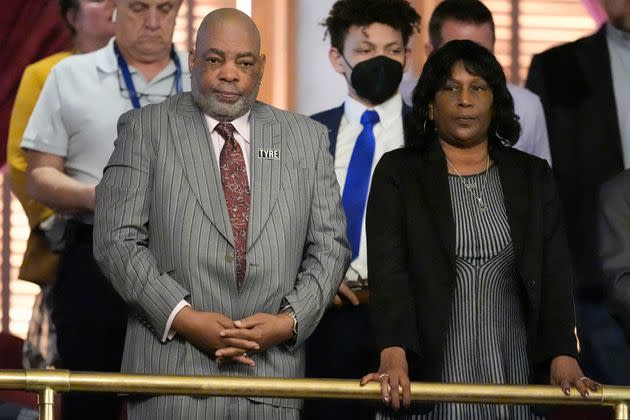Tennessee Senate Passes Bill That Would Undo Police Reforms Put In Place After Tyre Nichols’ Death
The Tennessee Senate on Thursday passed a bill that would restrict local governments’ power to pass police reform measures — and would undo a police reform ordinance that Memphis’ City Council passed after police there beat Tyre Nichols, a Black man, to death last year.
The GOP-led state Senate passed the bill by a vote of 26-6. The bill is moving to Republican Gov. Bill Lee’s desk next.
Democrats in both Tennessee’s House and Senate have spoken out against the bill, which was initially brought to the floor by state Rep. John Gillespie (R). State Sen. Brent Taylor (R) presented a version of the bill to the Senate floor.
State Sen. London Lamar (D), who represents Memphis, introduced Nichols’ parents, Rodney Wells and RowVaughn Wells, on the Senate floor ahead of the vote. They have strongly opposed the legislation.

But Taylor argued that the Memphis City Council ordinance would give free rein to “violent criminals” in Memphis.
“Law enforcement groups support this bill,” Taylor said of the legislation passed by the Senate. “They think they need this bill, and it has caused a lot of communication in my community.”
He also argued that the city ordinance was causing confusion among Memphis police officers.
“We need to take the handcuffs off the police and put the handcuffs on the criminals where they belong,” Taylor said.
Tennessee Senate Minority Leader Raumesh Akbari (D), who represents Memphis, spoke in opposition to Taylor’s legislation. She described it as “extreme overreach” and “cruel” and invoked Nichols’ death.
“They still cannot say why they pulled that young man over. And they beat him. They beat him,” Akbari said. “It is surreal to see your city on the television when a horrific incident occurred.”
Akbari noted that the Memphis City Council approved the ordinance on a bipartisan vote following Nichols’ death.
Elected officials are currently sparring over the bill before it is voted on. Sen. Raumesh Akbari (D) is speaking in opposition of the bill that would end police reform ordinances in Memphis. pic.twitter.com/oEqddL5XPN
— Phillip Jackson (@phillej_) March 14, 2024
Gillespie argued in a statement previously that the legislation was necessary, and that it “prioritizes the safety of citizens.” He described Memphis as a “safe haven for criminals.”
But Democrats pushed back against Gillespie, arguing that the bill would increase distrust between civilians and police and would undo any real progress toward police reform.
They have also expressed frustration that Republicans may have misled Nichols’ family about when the bill would be up for a vote. Nichols’ family said last week that they’d been told the bill had been tabled until the end of the month, but the state House passed it on March 8.
The lack of clarity over the vote timing was a miscommunication, Gillespie told HuffPost in a statement last week, adding that Nichols’ family was aware the bill was on the legislative calendar.
“My heart breaks for Tyre Nichols’ entire family,” Gillespie said in the statement. “They have lost a son, and they are in unimaginable pain. I have talked with them, and I hope to continue to keep an open dialogue. They were aware that this item would be on the calendar today. My No. 1 priority has always been to improve public safety and to make Memphis a safe city again.”
Gillespie added: “This legislation is about enforcing the state laws we already have on the books. No local government should be allowed to make any city less safe, nor should our law enforcement ever be put in the position of choosing which laws they should enforce.”
Nichols died of blunt force trauma to the head on Jan. 10, 2023, three days after multiple police officers had spent minutes punching him, kicking him and beating him with a baton during a traffic stop in Memphis. His death was ruled a homicide. Five officers, all of whom are also Black, were charged in his killing. Nichols was 29.
Memphis’ City Council passed the Driving Equality Act last year, in an attempt to minimize confrontations between officers and city residents. The act bans police from stopping civilians for minor traffic violations such as a broken taillight. Such guidance would be rolled back if the legislation passed by the state legislature becomes law.
The law would impose regulations on a city that has already taken steps to reduce dangerous traffic stops, Akbari told HuffPost.
“Our concern is that this is just another move to take away local control and really take away the ability for local police departments and local governments to work together to make sure that our citizens stay safe,” Akbari said.
Lamar also expressed frustration that Republicans were trying to “undo the efforts” her city had made.
“All of us want to solve crime,” she said, noting that Nichols, who was pulled over by police on suspicion of reckless driving, was not a criminal.
“We are struggling in Memphis but that does not mean we need to infringe on people’s rights in order to justify our efforts to reduce crime,” Lamar said. “It is frustrating for us. [Republicans] are basically saying police should be able to do anything to a citizen in efforts to combat crime. And we don’t believe that.”
